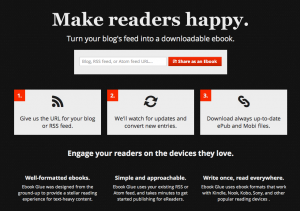Shantanu Bala figures he was probably around 10 or 11 years old when he first began picking up the basics of computer programming. “I was just really interested in technology and video games when I was young,” he says. Along with a few friends, he started toying around with those video games—learning how they worked, and attempting to modify them—”and eventually,” he says, “that led to having to learn more complicated things.”
Today, Bala is an 18-year-old Arizona State University student, although he’s currently spending a semester abroad in Copenhagen. (That’s him in the photo on the right.) He’s also the founder of Ebook Glue, a less-than-two-week-old online service that allows anyone to turn a blog into an e-book.
And the Ebook Glue service, by the way, couldn’t possibly be simpler: Just type in your blog’s URL (or the URL of its RSS feed), click a button, and voilà! Two links will appear—one link downloads your blog as an EPUB file, while the other downloads it as a MOBI file. You’ll also be given a unique URL that’s meant to be shared; anyone with access to that URL will also be able to download your blog-as-an-ebook.
![]() Speaking over a Google Voice line from his temporarily-adopted home in Denmark, Bala says the idea for Ebook Glue came to him after he purchased an Amazon Kindle a couple years back, and soon realized he was reading more than he ever had before. But as Bala’s reading habit matured, he found that books alone weren’t necessarily quenching his thirst. “I really like reading content from the Web as well,” he says. “And for some reason, about six months ago, I was thinking, ‘Wouldn’t it be cool if there was some way for bloggers to control how they present their content to their readers?’ I started working on [that idea] in my free time, and eventually, it turned into something that was actually kind of useful.”
Speaking over a Google Voice line from his temporarily-adopted home in Denmark, Bala says the idea for Ebook Glue came to him after he purchased an Amazon Kindle a couple years back, and soon realized he was reading more than he ever had before. But as Bala’s reading habit matured, he found that books alone weren’t necessarily quenching his thirst. “I really like reading content from the Web as well,” he says. “And for some reason, about six months ago, I was thinking, ‘Wouldn’t it be cool if there was some way for bloggers to control how they present their content to their readers?’ I started working on [that idea] in my free time, and eventually, it turned into something that was actually kind of useful.”

Regardless of Ebook Glue’s usefulness, though, Bala still isn’t entirely sure how the project might evolve in the coming months. Lately, he’s been mulling over potential business plans. “My goal isn’t necessarily to look at it as the next Facebook, or anything like that,” he says with a laugh. “I’m just looking for ways to make it sustainable, mainly so it can continue to spread.”
One potential idea he’s considering is a simple fee-for-use structure: “If I make it easy for people to sell their e-books,” he says, “I could maybe take a commission, or something like that.” (For the time being, the site is entirely free to use.)
Of course, considering that the site has only been online for two weeks now, it stands to reason that Ebook Glue is still far from perfect. You may be disappointed to learn, for instance, that only the content that appears on a blog’s first page appears in the “glued” e-book. But along with other fixes, that’s an improvement Bala is currently in the process of tweaking.
Even more exciting is the news that Bala wants Ebook Glue to eventually work on all websites, as opposed to working exclusively with blogs. He’s even teamed up with Readability, which has been kind enough to allow him access to some of their tools. Of course, it’s still a bit too early in the game to know exactly how Ebook Glue’s Web content experience might differ from, say, the Send to Kindle experience, or the Instapaper Kindle app experience. But I, for one, am willing to wait to find out.



































“You may be disappointed to learn, for instance, that only the content that appears on a blog’s first page appears in the “glued” e-book.”
I don ‘t understand. Does the sentence above mean when you upload your blog the only page people can read is the blog’s first page? If that’s the case, what is the point?
Thank you,
Pam B
Hi Pam – yes, that’s exactly what that means. And as for the point … well, I think the two main points to keep in mind are that (1), this is a brand-new service that’s only been live online for two weeks, and as such, it’s very much still a work-in-progress. And (2), the service will soon be able to capture all of a blog’s text – or at least that’s one of Bala’s plans, as far as I understand it.
True, it’s not an earth-shattering project as it currently stands. But it has the potential to be something really useful – especially to those of us who prefer to read with E Ink e-readers. (As opposed to smartphones or tablets.)
So, it’s currently like dotEPub except it’ll allow a blog owner more control over the generated ebook if they support this site?
And the goal is something like FLAG, which creates complete eBooks of stories in multiple different formats from a large collection of fan fiction sites? Except for blogs and other sites?
More options are nice but the idea isn’t really new.
There are more and more things like this popping up that bring ePub creation into the hands of everyman. For example, folks who have a computer running MacOS X 10.7 or later can create ePub-based eBooks from just about anything they can select. Find the details at Padilicious: http://www.macosxautomation.com/lion/epub/index.html
Getting a blog into ePub or mobi is of limited value. That and HTML are all digital viewing formats. Perhaps of more value would be software that turns a blog into something that can become a printed book or output as ePub or mobi.
For that, .doc format conversion is needed, changing coding into a Heading 1 style and the like. Microsoft’s doc format is dreadful, but it will let you move those blog posts into page layout programs such as InDesign.
In short, .doc is an input format that can be used to create all sorts of outputs (i.e. via Smashwords). On the other hand, ePub and mobi are output formats, currently of little value except for viewing. Editing them into something that looks better is a bit like editing raw HTML.
Andy — Right, the idea definitely isn’t new, although Shantanu is well aware of that.
(In fact, as I mentioned toward the end of the story, he’s working with Readability, which does essentially the same thing for Web content. As for why Readability is working with him? I don’t know. They probably saw something in him, as did I.)
The truth is that there are tons of different content-capture services and apps out there. But I find that some of them work better than others in *certain* ways. For instance, if I want to send an online article to my smartphone (so I can read it while walking down the street, for instance), I use the Pocket app (for Android) every time. I just really like how it appears on my phone. But if want to send an article to my Kindle 4, I’ll use Send to Kindle … except lately it’s been acting buggy, so I’ve been using Instapaper and pushing the article through my online Amazon account. (Kind of a pain.)
Likewise, I used to love Pulse, but now that I’ve discovered Google Currents … wow. It’s the only app of its sort that I use. (And it looks almost as good on my phone as on my Google Nexus 7, where it really shines.) Google Play Books, meanwhile, is kind of awful — in my opinion at least.
As for Ebook Glue … I don’t really know where it’s going to end up, and I don’t really think Shantanu does, either. (The kid’s only 18; I’m sure he has a lot of priorities that don’t involve reading!) But both he and his project will be worth keeping an eye on as they evolve, I think.
E-books aren’t as great to read as old school hard-bound books that you can cuddle up with in your bed. But, with some topics,for private tutor coventry please visit our website